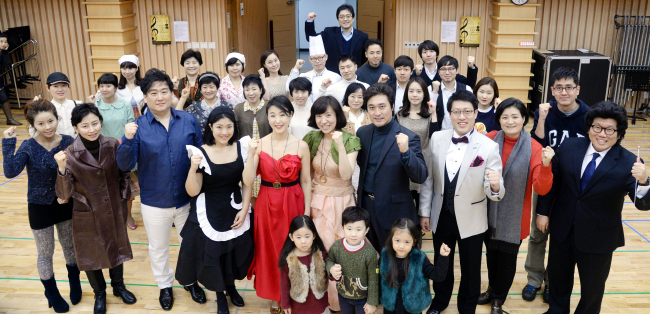Making opera accessible
RAMK aims to attract new opera fans with ‘Cosi fan Tutte’
By Korea HeraldPublished : Feb. 10, 2014 - 19:42

Seasoned classical singers, musicians and theatrical professionals have teamed up onstage to make a Mozart opera an enjoyable mix of music and laugh-out-loud comedy.
“A mission has brought us all here,” said Chang Jae-young, president of Royal Art & Music Korea, as his team rehearsed for the upcoming production of “Cosi fan Tutte” on Sunday afternoon.
“That is to make opera more accessible.”
And it is no easy undertaking.
“Cosi fan Tutte” is the final piece in an opera trilogy written by Mozart in collaboration with librettist Lorenzo da Ponte.
Revolving around two young lads ― Guglielmo and Ferrando ― who set out to test their lovers’ fidelity, the opera is a comedy with some serious undertones about love. The title roughly translates as “all women are like that.”
To make the theme, story and music more appealing and enjoyable to modern-day Koreans, Chang’s team has made some serious adaptations: the Italian recitative has been replaced by spoken dialogue in Korean; the setting has been moved to 1950s New York, instead of 18th-century Naples; and new roles have been added, including three cupids played by adorable child actors.
All in all, the production of Cosi is all about a “sit-back and enjoy” experience for the audience, in stark contrast to the traditional image of opera.
“With this production, we’re challenging the public perception of opera as something stuffy,” Chang said. He wants to let people know that opera can be a wonderful pastime and not necessarily a serious encounter with high art.
Theatrical director Lee Do-yeop was chosen because of this.
Hailing from a non-operatic background (Lee’s past work includes locally produced musicals and plays but no opera), the director was asked to bring a fresh perspective to the opera and bring the opera singers’ comic abilities out.
“Their (opera singers) singing is so solid, but the way they move on stage was a bit of problem to me,” he said.
In opera, the cast engages in acting but when it is time to deliver an aria, they just stop and switch to singing mode ― a forward-facing position with the open-arms gesture of a solo recitalist, he explained.
“I wanted them to move freely. I asked them to run in scenes where they otherwise would have walked.”
For singers, an undertaking like this is always worth getting involved in, said baritone Noh Dae-san, who plays Guglielmo.
“The playacting, Korean-language dialogue and all other little tactics employed in this production are intended to help the audience better enjoy the performance. After all, that’s what we, opera singers, want the most,” he said.
Tenor Kang Simon, who plays Ferrando, said that the intimate 400-seat theater where they will perform is another element that works toward that end.
“The Korean opera scene is so focused on grand operas. But a small-scale one like this is a great opportunity for the audience to indulge in opera, as the stage and the orchestra are so close to the audience,” he said.
Conductor Yang Tae-gap agreed. For an orchestra to be seated so close to the audience was a challenge as well as an opportunity, he said.
“Because of the intimacy of the theater, the orchestra, as well as the main singers, makes extra endeavors not to make any mistake right in front of the audience,” he said.
In the end, music is the essence of an opera, he went on. All of their maneuvers are to help the audience to better enjoy the music.
The show offers a dazzling vocal kaleidoscope, the conductor explained, one that ranges from solo arias to quartets, quintets to an outright chorus.
Tenor Kang said, “Once the audience feels the beauty of the human voice, they’ll become ardent fans of opera.”
“My definition of success for this production,” he went on, “is to turn any single member of the audience who was a non-opera theatergoer before into an opera fan after watching our show.”
For Chang and RAM Korea, the quest to popularize opera in Korea will continue after “Cosi.” He is already looking at one or two operas as candidates for his next undertaking.
“Putting on an opera onstage is not a profitable business right now,” he said. Despite its high production cost, an opera production can’t go on a long run, because of the vocal strain it could inflict on opera singers who do not use microphones. To put up two performances of “Cosi,” for example, he had to double-cast all the singers.
“Still I will keep trying, enticing a broader audience with low-risk, small-scale but well-made operas,” he said.
The RAM Korea production of “Cosi fan Tutte” will be performed tonight and tomorrow at M Theater of Sejong Center for Performing Arts in Seoul. Ticket prices range from 50,000 won to 150,000 won. For more information, call 02) 532-1725.
By Lee Sun-young (milaya@heraldcorp.com)
-
Articles by Korea Herald




![[Herald Interview] 'Amid aging population, Korea to invite more young professionals from overseas'](http://res.heraldm.com/phpwas/restmb_idxmake.php?idx=644&simg=/content/image/2024/04/24/20240424050844_0.jpg&u=20240424200058)













![[KH Explains] Korean shipbuilding stocks rally: Real growth or bubble?](http://res.heraldm.com/phpwas/restmb_idxmake.php?idx=652&simg=/content/image/2024/04/25/20240425050656_0.jpg&u=)

